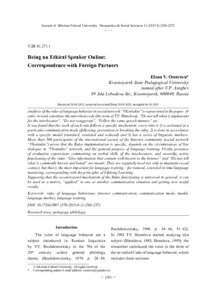Being an Ethical Speaker Online: Correspondence with Foreign Partners
Скачать файл:
URI (для ссылок/цитирований):
https://elib.sfu-kras.ru/handle/2311/19917Автор:
Osetrova, Elena V.
Осетрова, Е.В.
Дата:
2015-11Аннотация:
Analysis of the rules of language behavior in social network “VKontakte” is represented in the paper. 14
rules in total constitute the unwritten code (the term of T.V. Shmeleva): “Do not tell what is unpleasant
for the interlocutor”, “Do not exaggerate”, “Follow the same speech manner” etc.
It was found that the work of each rule follows a specific mechanism: every time it 1) is activated in a
particular communicative mode (following, prevention or breaking the rule), 2) is done in accordance
with a specific model (standard, extended and reduced) and 3) has a series of linguistic markers.
More than 500 participants of the international society of the Internet community (social network
“Vkontakte”) prove that the Rules implementation is specific, depends on the circumstances of live
dialogue in “Vkontakte” network, and the general purpose of language training. Firstly, presence
of evaluative expressions commenting on verbal skills of the interlocutors, and secondly, active
functioning of the rules “Give information that contain well-known to the listener” and “Do not tell
what is commonly known and banal” are meant. They are regularly used not only to maintain social
contact, but that is the most important for language training – for natural, extended in time language
mastering, corresponding with the principles of Lifelong Learning.
Supposing that the reconstructed mechanism of the Rules functioning is universal in general, it can
be used as a matrix, “applied” to one or another communicative situation and getting new useful
results В статье представлен анализ правил речевого поведения в социальной сети «Вконтакте».
14 правил в совокупности формируют неписаный кодекс (термин Т.В. Шмелевой): «Не
говори неприятности собеседнику», «Не преувеличивай», «Придерживайся одной речевой
манеры» и др.
Выявлено, что работа каждого правила подчинена определенному механизму: всякий раз
1) активируется в том или ином коммуникативном режиме (соблюдение, профилактика или
нарушение правила), 2) оформляется в соответствии с определенной моделью (стандартная,
расширенная, редуцированная) и 3) имеет серию языковых маркеров. Более 500 диалогов
участников интернационального интернет-сообщества (социальная сеть «ВКонтакте»)
доказывают, что реализация правил специфична, подчиняясь обстоятельствам живого
диалога «Вконтакте» и генеральной цели обучения языку. Имеются в виду, во-первых,
присутствие оценочных выражений, комментирующих вербальные навыки собеседников,
а во-вторых, активное функционирование правил «Сообщай информацию, содержащую
известное для слушателя» и «Не сообщай общеизвестного, банального». Они регулярно
используются не только для поддержки социального контакта, но, что принципиально
важно, для речевой тренировки – для естественного, растянутого во времени освоения
языка, согласованного с установками Lifelong Learning.
Если предположить, что реконструированный механизм функционирования правил в целом
универсален, то его можно применять как матрицу, «накладывая» на ту или иную ситуацию
общения и получая новые полезные результаты
Коллекции:
Метаданные:
Показать полную информациюСвязанные материалы
Показаны похожие ресурсы по названию, автору или тематике.
-
Ethnolinguistic Ecology of the Peoples of the North, Siberia and the Far East (On the Material of the Languages of the Northern Group of the Manchu-Tungus Languages)
Petrov, Alexander A.; Razumovskaya, Veronica A.; Петров, А. А.; Разумовская, В. А. (Сибирский федеральный университет. Siberian Federal University, 2019-08)The article is devoted to the problem of ethnolinguistic ecology of the indigenous peoples of the North, Siberia and the Far East — speakers of the northern group of the Manchu-Tungus languages of the Altai linguistic ... -
Ethnolinguistic Ecology of the Peoples of the North, Siberia and the Far East (On the Material of the Languages of the Northern Group of the Manchu-Tungus Languages)
Petrov, A. A.; Razumovskaya, V. A. (2019-08)The article is devoted to the problem of ethnolinguistic ecology of the indigenous peoples of the North, Siberia and the Far East — speakers of the northern group of the Manchu-Tungus languages of the Altai linguistic ... -
The Factors of British and American English Development under Globalisation
Melnichenko, Konstantin A.; Мельниченко, К.А. (Сибирский федеральный университет. Siberian Federal University., 2014-06)The paper studies the processes which arise during language contacts between the most influential varieties of the English language, British English and American English (BE and AE), and various autochthonous languages ... -
Этноязыковая ситуация Красноярского края в начале третьего тысячелетия
Фельде, О.В.; Felde, Olga V. (Сибирский федеральный университет. Siberian Federal University., 2011-07)This article presents the up-to-date view of ethno-linguistic situation in polylanguage and polycultural the Krasnoyarsk Territory. The functional typology of languages of this Siberian region has been given; historical ... -
Problems of Preserving the Kazakh Language in China: Threats of Extinction and Ways of Solution
Zharkynbekova, Sholpan K.; Tazhibayeva, Saule Zh.; Filchenko, Аndrey U.; Жаркынбекова, Ш. К.; Тажибаевa, С. Ж.; Фильченко, А. Ю. (Journal of Siberian Federal University. Сибирский федеральный университет, 2025-03)This article examines the Kazakh language spoken in China, focusing on its unique characteristics, historical development, and challenges in the context of globalization and sociolinguistic transformations. The study ...

